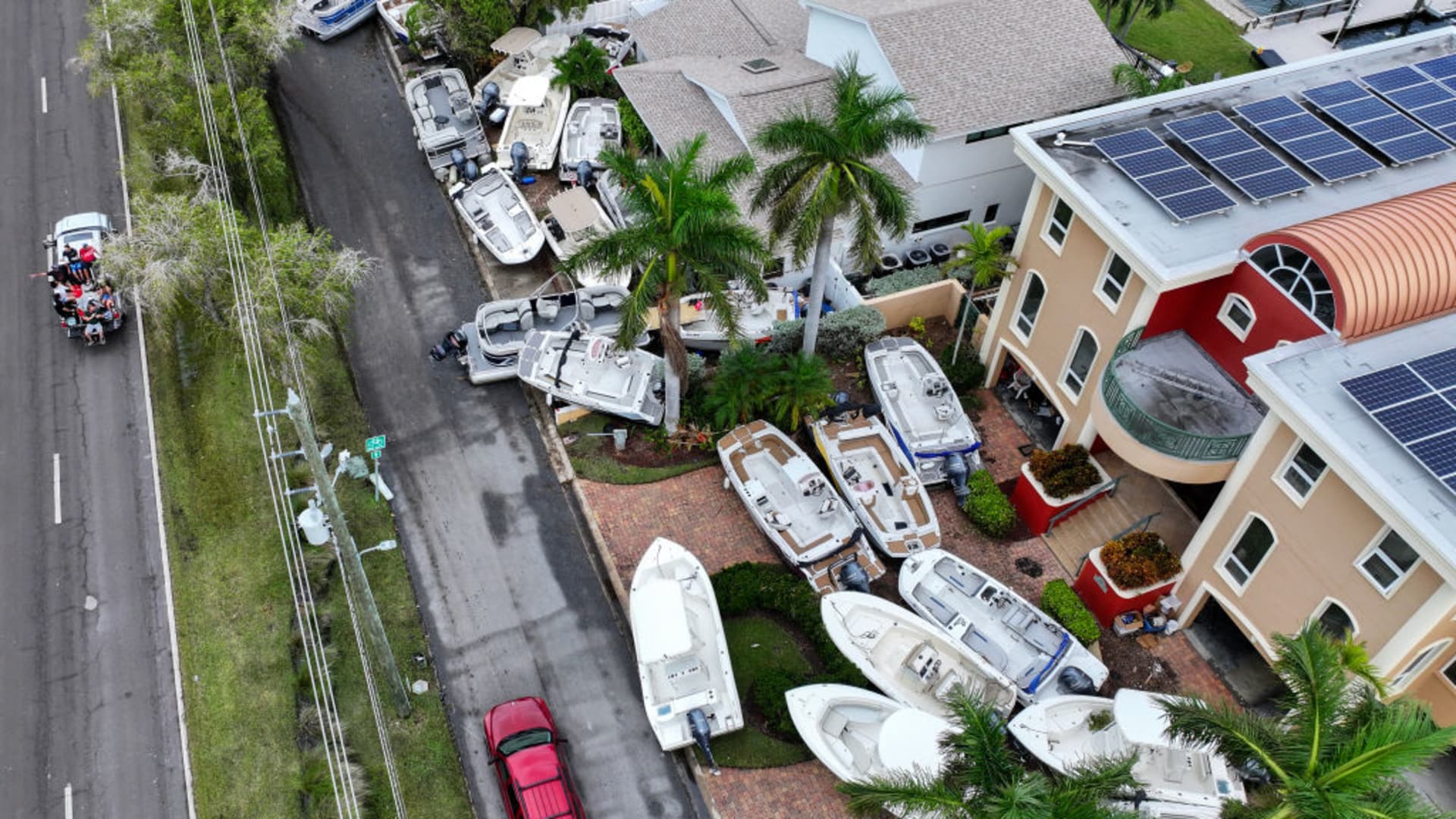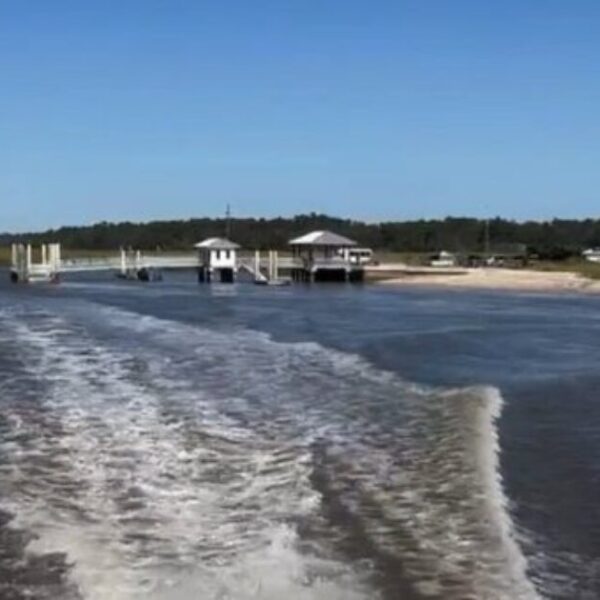States across the Southeastern U.S. started a massive cleanup and recovery effort on Sunday after winds, rain and storm surges from Hurricane Helene knocked out power for millions, destroyed roads and bridges, and caused catastrophic flooding from Florida to Virginia.
The death toll continues to climb as emergency responses continue in South Carolina, Florida, Georgia, North Carolina and Virginia. The storm killed at least 69 people, according to a Reuters tally of state and local officials. Officials feared still more bodies would be discovered.
Damage estimates ranged from $15 billion to more than $100 billion, insurers and forecasters said over the weekend. Property damage and lost economic output will become clearer as officials assess the destruction.
In this aerial view, boats are piled up in front of homes after Hurricane Helene hit the area as it passed offshore on September 28, 2024 in Treasure Island, Florida. Hurricane Helene made landfall Thursday night in Florida’s Big Bend with winds up to 140 mph and storm surges that killed at least 42 people in several states.
Joe Raedle | Getty Images News | Getty Images
South Carolina recorded the highest death toll, reporting 25 fatalities, with falling trees contributing to many of them.
“It’s a devastating blow, but we can make it through,” South Carolina Governor Henry McMaster said at a press conference on Sunday. “Help is on the way, but it is going to take time.”
In North Carolina, the death toll rose to 11, Governor Roy Cooper said. All roads in the western end of the state should be considered closed and will take months to repair, he said. Food and water are being airlifted to those areas.
In Flat Rock, North Carolina, there were widespread blackouts, and people waited hours in line for gas.
“Grocery stores are closed, cellphone service is out,” Chip Frank, 62, said as he entered his third hour waiting in line. “It all depends on these gas stations. You’re not going to be able to go nowhere, and it’s just a scary feeling.”
The storm has damaged water systems, communications and critical transportation routes across the region, according to the Federal Emergency Management Agency. The Army Corps of Engineers will start assessing damage to water systems on Sunday to help them get back online, FEMA said.
Roughly 2.7 million customers were without power on Sunday, a U.S. Energy Department official said, down 40% from Friday after unprecedented storm surges, ferocious winds and perilous conditions extended hundreds of miles inland.
A drone view shows a flooded and damaged area, following Hurricane Helene in Steinhatchee, Florida, U.S., September 27, 2024.
Marco Bello | Reuters
Florida’s Gulf Coast hit
Days of driving rain followed after Helene slammed into Florida’s Gulf Coast on Thursday night, destroying homes that had stood for decades.
Eleven people died in Florida, Governor Ron DeSantis said on Saturday in the Gulf Coast city of Perry, which saw 15-foot (4.5-meter) storm surges, larger than those seen in other hurricanes in recent years.
In Horseshoe Beach, on Florida’s Gulf Coast about 70 miles (120 km) west of Gainesville, Charlene Huggins surveyed the debris of her blown-out house, pulling a jacket out of the rubble on Saturday.
“Five generations lived in this house, from my grandmother, my father, myself, my daughter, son and my granddaughter,” Huggins said, holding a chipped glass cake stand. “So there’s a lot of memories here. It just breaks your heart.”
David Hester inspects damages of his house after Hurricane Helene made landfall in Horseshoe Beach, Florida, on September 28, 2024.
Chandan Khanna | Afp | Getty Images
Not far away, James Ellenburg stood on the property where his own family has lived for four generations. “I took my first step right here in this yard.”
The roof of one home sat flat in the dirt, its walls blown away.
In coastal Steinhatchee, a storm surge — a wall of seawater pushed ashore by winds — of eight to 10 feet (2.4 to 3 meters) moved mobile homes, the weather service said.
In the nearby tiny community of Spring Warrior Fish Camp, people were surveying the damage on Saturday and still waiting for emergency or first responder aid.
“No one thinks of us back here,” said David Hall, as he and his wife dug through seagrass and dead fish in the office of the hotel they owned. Many of the community’s homes are built on stilts because of a local ordinance and survived heavy damage.
Kristin Macqueen was helping friends clean up after their house was destroyed in nearby Keaton Beach. “It’s complete devastation. Houses have just been ripped off their slabs,” she said.
Some of the worst rains hit western North Carolina, where almost 30 inches (76 cm) fell on Mount Mitchell in Yancey County, the National Weather Service’s Weather Prediction Center reported.
In this aerial view, power crews work on the lines after Hurricane Helene passed offshore on September 27, 2024 in Crystal River, Florida.
Joe Raedle | Getty Images News | Getty Images
Water washed over Lake Lure Dam in Rutherford County, and people in and around Chimney Rock described the village’s downtown as washed out. Images showed accumulated mud and sediment, uprooted trees and snapped telephone poles, and buildings turned into debris.
Just to the south in eastern Tennessee, Greene County officials worried that the Nolichucky Dam was on the brink of failure, but the Tennessee Valley Authority reported late Saturday that it was stable and secure.
Seventeen people, including children, died in Georgia, Governor Brian Kemp said after viewing damage in Valdosta.
“It’s tragic,” U.S. President Joe Biden told reporters on Sunday, a day after declaring a major disaster in Florida. “You saw the photographs. It’s stunning.”















